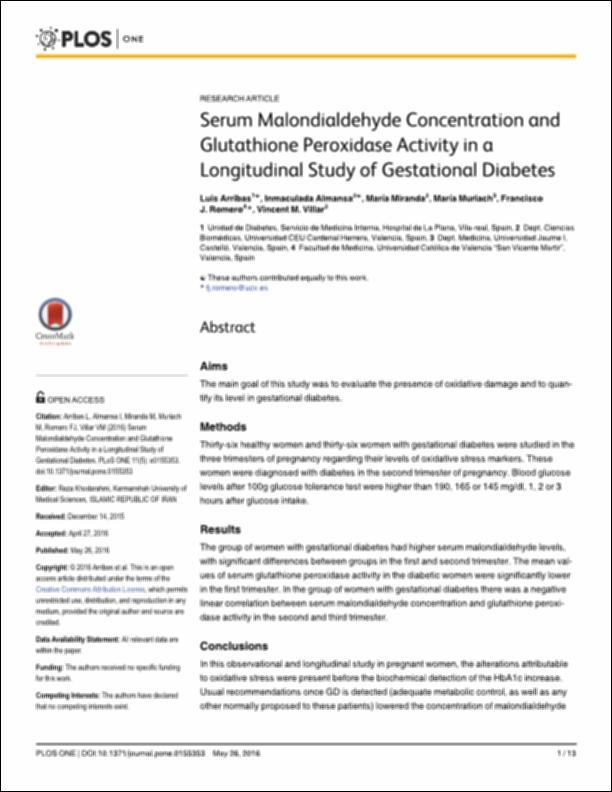Please use this identifier to cite or link to this item:
http://hdl.handle.net/10637/10607Serum malondialdehyde concentration and glutathione peroxidase activity in a longitudinal study of gestational diabetes
| Title: | Serum malondialdehyde concentration and glutathione peroxidase activity in a longitudinal study of gestational diabetes |
| Authors : | Arribas Palomar, Luis Domingo Almansa Frías, María Inmaculada Miranda Sanz, María Muriach Saurí, María Romero Gómez, Francisco Javier Villar Amigó, Vicente |
| Keywords: | Estrés oxidativo.; Diabetes in pregnancy.; Diabetes en el embarazo.; Oxidative stress. |
| Publisher: | PLOS |
| Citation: | Arribas, L., Almansa, I., Miranda, M., Muriach, M., Romero, FJ. & Villar, VM. (2016). Serum malondialdehyde concentration and glutathione peroxidase activity in a longitudinal study of gestational diabetes. PLoS ONE, vol. 11, n. 5 art. e0155353. DOI: https://doi.org/10.1371/journal.pone.0155353 |
| Abstract: | Aims. The main goal of this study was to evaluate the presence of oxidative damage and to quantify its level in gestational diabetes. Methods. Thirty-six healthy women and thirty-six women with gestational diabetes were studied in the three trimesters of pregnancy regarding their levels of oxidative stress markers. These women were diagnosed with diabetes in the second trimester of pregnancy. Blood glucose levels after 100g glucose tolerance test were higher than 190, 165 or 145 mg/dl, 1, 2 or 3 hours after glucose intake. Results. The group of women with gestational diabetes had higher serum malondialdehyde levels, with significant differences between groups in the first and second trimester. The mean values of serum glutathione peroxidase activity in the diabetic women were significantly lower in the first trimester. In the group of women with gestational diabetes there was a negative linear correlation between serum malondialdehyde concentration and glutathione peroxidase activity in the second and third trimester. Conclusions. In this observational and longitudinal study in pregnant women, the alterations attributable to oxidative stress were present before the biochemical detection of the HbA1c increase. Usual recommendations once GD is detected (adequate metabolic control, as well as any other normally proposed to these patients) lowered the concentration of malondialdehyde at the end of pregnancy to the same levels of the healthy controls. Serum glutathione peroxidase activity in women with gestational diabetes increased during the gestational period. |
| Description: | Este artículo se encuentra disponible en la siguiente URL: https://journals.plos.org/plosone/article?id=10.1371/journal.pone.0155353 |
| URI: | http://hdl.handle.net/10637/10607 |
| Rights : | http://creativecommons.org/licenses/by/4.0/deed.es |
| ISSN: | 1932-6203 (Electrónico) |
| Issue Date: | 26-May-2016 |
| Center : | Universidad Cardenal Herrera-CEU |
| Appears in Collections: | Dpto. Ciencias Biomédicas |
Items in DSpace are protected by copyright, with all rights reserved, unless otherwise indicated.


